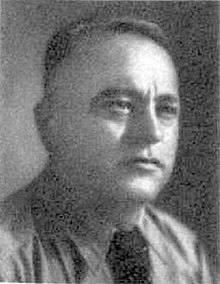Josef Bürckel
| Joseph Bürckel | |
|---|---|
 Joseph Bürckel in circa 1938. | |
| Gauleiter of Westmark | |
|
In office 1933–1944 | |
| Preceded by | none |
| Succeeded by | Willi Stöhr |
| Gauleiter of Vienna | |
|
In office 1939–1940 | |
| Preceded by | Odilo Globocnik |
| Succeeded by | Baldur von Schirach |
| Member of the German Reichstag | |
|
In office 1930–1944 | |
| Personal details | |
| Born |
30 March 1895 Lingenfeld |
| Died |
28 September 1944 (aged 49) Neustadt an der Weinstraße |
| Nationality | German |
| Political party | Nationalsozialistische Deutsche Arbeiter Partei |
| Occupation | political officer |
Joseph Bürckel (30 March 1895, in Lingenfeld, Germersheim – 28 September 1944, in Neustadt an der Weinstraße) was a Nazi Germany politician and a member of the German parliament (the Reichstag). He was an early member of the NSDAP party and was influential in the rise of the National Socialist movement.
Biography
Joseph Bürckel was born in Lingenfeld, in the Bavarian Palatinate, as the son of a tradesman. From 1909 to 1914 he studied to become a teacher in Speyer.[1]
He took part in the First World War as a volunteer. After the war, he continued his training as a teacher and graduated in 1920. From 1921 onwards, he was engaged in nationalist groups, fighting separatism in the Palatinate.
An energetic organizer in National Socialist movement of the Saar-Palatinate since 1925, the former schoolmaster rose through the ranks to become Gauleiter (Nazi Party leader) for the region in 1934.
On 13 March 1938 Bürckel was appointed acting head of the Party to carry out the referendum on the Anschluss (Austria's absorption into Germany). From 23 April 1938 to 31 March 1940 he worked as Reichskommissar for the union of Austria with the German Reich, in charge of fully integrating it as the Ostmark politically, economically and culturally into the latter. He declared: "This is a revolution. The Jews may be glad that it is not of the French or Russian pattern."[2] Saying Vienna was "overfilled with Jews" he stated his aim to leave them with no more than five percent of their property.[3] On 20 August 1938, he established the Central Agency for Jewish Emigration in Vienna, at first responsible for the forced emigration of Jews, and later for the subsequent deportation and murder of at least 48,767 Austrian Jews out of Vienna.
Bürckel served as Gauleiter of Vienna and Reichsstatthalter (governor) of the region from 30 January 1939 to 7 August 1940, working to further unification with Nazi Germany, including promoting anti-Jewish decrees and seizing Jewish property. He frequently embezzled confiscated money and property instead of turning it over to the state, earning him the displeasure of the Nazi hierarchy and he was eventually removed from his post in Vienna. Upon his return to the Westmark, he continued his previous lifestyle and spent large sums on purchasing artworks.[4]
Following his role as Gauleiter, Bürckel headed up the civil administration in Lothringen and from 1941 was governor of the Gau Westmark, composed of the Bavarian Palatinate district, the Prussian Saar territory and the annexed département of Moselle.
From 9 November 1937 he also held a leading position (Gruppenführer) in the Schutzstaffel and the staff of the Reichsführer-SS, Heinrich Himmler.
Bürckel died at about 11:04 a.m. in Neustadt-an-der-Weinstrasse on 28 September 1944. A report from Bürckel's personal physician (since 1936), Gaugesundheitsführer Ewig, dated 28 September 1944, stated that Bürckel was physically and mentally worn out, spending all of his time at work because of the deteriorating situation in his Gau. He suffered an inflammation of the intestine with diarrhea, eventually becoming too ill to continue. Ewig was called in on 26 September 1944. Bürckel soon contacted pneumonia and blood failure. Josef Rowies, another physician, stated on 23 October 1944 that the report of his death sent to the SS-Personalhauptamt (the personnel records office) by Himmler's personal staff office on 9 October 1944 had been "doctored" to conceal his mental breakdown. The consensus was that he gave up the will to live, dying of the symptoms shown in the death certificate plus exhaustion. On 8 September 1944, in a letter to Martin Bormann (with whom Bürckel didn't get along), Bürckel opined that the lack of combat-ready troops to occupy the defensive line of the Moselle from the boundary of Gau Westmark via the arsenal of Metz-Diedenhofen, south of Saint-Avold (part of the Maginot Line), to Sarralbe made construction of such defensive positions useless. Bormann responded by dispatching Willi Stöhr (who was to succeed Bürckel after his death) to oversee the construction work.
Five days after Bürckel's death, Hitler awarded him the German Order, the highest decoration that the Party could bestow on an individual, for his services to the Reich.
External links
- Farewell to Gauleiter Bürckel Translation of the Berliner Morgenpost, 5 October 1944
Sources
- Reichsgau Wien (German) at Verwaltungsgeschichte.de
- Josef Bürckel - Gauleiter der Westmark (German) Josef Bürckel biography
References
- ↑ Josef Bürckel - Gauleiter der Westmark (German) Josef Bürckel biography, accessed: 10 February 2009
- ↑ MacDonogh, G. 1938: Hitler's Gamble. New York: Basic Books, 2009. p 137.
- ↑ MacDonogh 2009, p. 137.
- ↑ Google book review: Art As Politics in the Third Reich author: Jonathan Petropoulos, publisher: UNC Press, page: 239-240, accessed: 10 February 2009
5. Gauleiter: Regional Leaders Of The Nazi Party And Their Deputies, 1925-1945 (Herbert Albrecht-H. Wilhelm Huttmann)-Volume 1 by Michael D. Miller and Andreas Schulz R. James Bender Publishing, 2012.
| |||||||||||||||||||||
|
.svg.png)